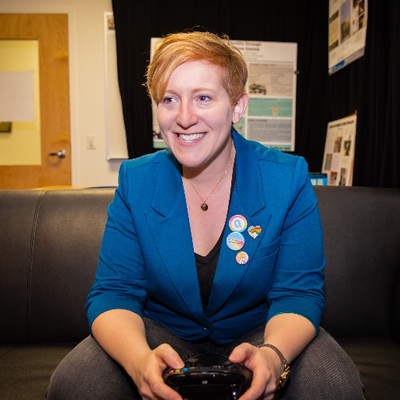Please note: The deadline for applications for the fall 2017 entering Ph.D. cohort in UC Irvine’s Department of Informatics is December 15, 2016. For more information, visit this page.
Queer game studies is a burgeoning scholarly research area dedicated to exploring video games, analogue games, and play through LGBTQ issues and queer theory. Scholars who do queer game studies works come from many disciplinary backgrounds, such as the humanities, social sciences, information sciences, and digital arts and design.
For an introduction to queer game studies, as well as a recommended reading list of current queer game studies scholarship, please see “Queer Game Studies 101: An Introduction to the Field (2016).” For more information about doctoral programs that support game studies work, check out “Getting a Ph.D. in Game Studies: A Guide for Aspiring Video Game Scholars.”
Because queer game studies is a relatively new and highly interdisciplinary field, students who are interested in pursuing this work at the graduate level will most likely be collaborating with individual faculty mentors inside doctoral programs not explicitly focused on games. Reaching out to potential advisors before applying will help you gauge the support a Ph.D. program can offer you in this area.
Queer Game Studies in UC Irvine’s Department of Informatics
In 2016, queer game studies scholar Bonnie Ruberg joined the faculty of the Department of Informatics at UC Irvine. At UCI, Informatics offers a rigorous Ph.D. program that trains students as experts on the relationship between society and the digital world. Thanks to a number of recent hires and other additions (e.g. Rebecca Black, Mimi Ito, Kurt Squire, Constance Steinkuehler, Josh Tanenbaum, Aaron Trammell), game studies is an increasingly vibrant presence in this department.
Professor Ruberg specializes in gender, sexuality, and digital games. She received her Ph.D. from UC Berkeley in conjunction with the Berkeley Center for New Media and was awarded a Provost’s Postdoctoral Scholarship in USC’s Interactive Media and Games Division. Along with a diverse network of collaborators, she runs the annual Queerness and Games Conference. She is also the co-editor of the volume Queer Game Studies and the author of a current book project titled Playing Queer: Queerness, Sexuality, and Gender in Video Games Beyond Representation.
Doctoral students who work with Professor Ruberg can expect to receive training in queer game studies in the following ways:
Grad courses offered through Informatics: graduate level classes exploring issues of gender and sexuality in digital media will be offered on a rotating basis. These provide a broad introduction to identity, LGBTQ issues, etc. in relation to games and information technology.
Regular lab meetings: as a small group, students meet with Professor Ruberg on a regular basis to present on their ongoing research, read and discuss recent queer game studies work, hear from visiting guests on interdisciplinary topics, and build academic community.
Interdisciplinary electives: Students working on queer game studies within Informatics have the opportunity to take electives related to queer studies and/or video games offered through other departments, such as Film and Media Studies, Gender and Sexuality Studies, and Anthropology. Course offerings change each year, but examples of relevant courses include:
– Queer Archives (Gen&Sex W16)
– Queer Anthropology (Anthro 252a)
– Feminist Knowledge (Gen&Sex W17)
– Digital Technologies, Culture, and Media (Anthro 250 B)
Teaching: Doctoral students in the Informatics program have the opportunity to serve as teaching assistants (TAs) for undergraduate courses. TAing for courses that relate to games, technology, and society provides doctoral students with experience instructing students in their area of interest.
Organizing and networking: A key tenant of queer game studies is social engagement. Students working with Professor Ruberg will have the opportunity to help organize events related to video game activism, through which they may meet a wide network of game scholars and makers.
How to Apply to Do Ph.D. Research in Queer Game Studies
Prospective students interested in working with Professor Ruberg on queer game studies research should apply to the Ph.D. program in Informatics at UC, Irvine. Information regarding the Informatics course requirements is available here. Please note that the deadline for applications for the incoming fall, 2017 cohort is December 15, 2016.
It is also strongly recommended that students hoping to do work in this area get in touch with Professor Ruberg via email (bruberg [at] uci [dot] edu) in advance of submitting their formal application. In this email, please briefly describe yourself, your research interests, and any questions you would like to ask about the program.
Masters students, undergraduates, and doctoral students from programs other than Informatics are also encouraged to explore queer game studies. Many of the resources listed are available to non-Informatics students. However, Professor Ruberg will only be able to serve as primary advisor for students working within the Department of Informatics.
Thank you for your interest in queer game studies. Wherever you go to pursue your research, you are sure to add valuable new work to this exciting field!

